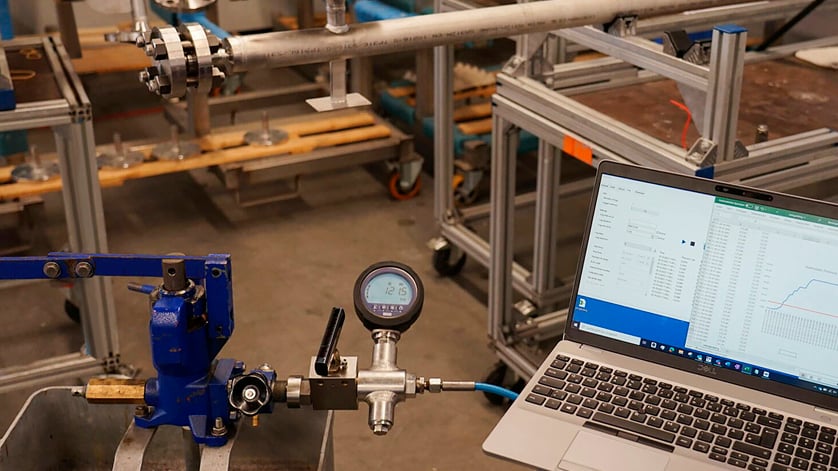
The Critical Role of Hydraulic Pressure Testing in Modern Manufacturing Excellence
July 21, 2025In today’s demanding industrial landscape, hydraulic pressure testing has become an indispensable cornerstone of manufacturing reliability and operational safety. As industries worldwide continue to embrace automation and advanced manufacturing technologies, the importance of robust testing protocols cannot be overstated.
What Is Hydraulic Pressure Testing?
Hydraulic pressure testing represents a systematic approach to validating the integrity and performance of hydraulic systems under controlled conditions. This critical process involves subjecting components to pressures exceeding normal operating parameters.
Key testing aspects include:
- Leak Detection: Identifying potential seal and joint failures
- Pressure Verification: Confirming system pressure capabilities
- Component Durability: Assessing long-term performance under stress
- System Performance: Validating overall operational efficiency
Why Hydraulic System Validation Matters More Than Ever
Singapore’s manufacturing sector contributes more than 20 per cent to its GDP, with total manufacturing output valued at around 396.63 billion Singapore dollars in 2023. The nation ranked second worldwide for industry-related robot density in manufacturing, demanding hydraulic systems that perform flawlessly under extreme conditions.
Key benefits of rigorous hydraulic testing procedures include:
- Enhanced Safety: Preventing catastrophic failures that could endanger personnel and equipment
- Improved Reliability: Ensuring consistent performance across operational lifecycles
- Cost Optimisation: Identifying issues before they escalate into expensive repairs
- Regulatory Compliance: Meeting stringent industry standards and safety requirements
Industry Applications and Market Dynamics
The global industrial hydraulic equipment market, valued at USD 37.5 billion in 2024 and expected to reach USD 52.6 billion by 2033, demonstrates critical importance across diverse sectors. Singapore’s strategic focus on advanced manufacturing aligns perfectly with these market trends, particularly given the nation’s ambitious “Manufacturing 2030” plan.
Market highlights include:
- Construction sector dominance: 24.5% market share in 2023
- Asia-Pacific growth: USD 19 billion market value in 2023
- Singapore’s manufacturing output: 396.63 billion Singapore dollars in 2023
- Electronics manufacturing: 167 billion Singapore dollars output in 2023
Best Practices for Hydraulic Pressure Testing
Implementing effective system pressure validation requires adherence to established methodologies and industry standards. Leading manufacturers follow these essential practices:
- Systematic Test Planning: Developing comprehensive testing matrices that cover all operational scenarios, including extreme conditions that components may encounter during service life
- Calibrated Equipment: Using precision instruments to ensure accurate pressure measurements, with traceability to national standards
- Documentation Protocols: Maintaining detailed records of test results and component performance, creating valuable databases for trend analysis
- Regular Calibration: Ensuring test equipment remains accurate and reliable through scheduled maintenance programmes
- Safety Procedures: Implementing robust safety measures to protect personnel during testing, including pressure relief systems and emergency protocols
- Environmental Controls: Maintaining consistent testing conditions to ensure repeatable and reliable results
Common Testing Methodologies
The hydraulic testing industry employs several standardised approaches:
- Burst Testing: Determines the ultimate pressure capacity of components
- Endurance Testing: Evaluates long-term performance under cyclic loading
- Leak Testing: Ensures system integrity under operational pressures
- Functional Testing: Validates component performance across operating ranges
These methodologies form the foundation of comprehensive quality assurance programmes essential in Singapore’s high-value manufacturing environment, particularly for electronics manufacturing equipment requiring exceptional precision.
The Technology Evolution
Modern hydraulic testing procedures have evolved significantly, incorporating advanced technologies that enable higher precision whilst reducing testing time and costs. The integration of Industry 4.0 principles has transformed traditional approaches, particularly relevant given Singapore’s industrial production increased 5.90 per cent in April of 2025.
Key technological advances include:
- Automated Testing Systems: Reducing human error and increasing throughput
- Digital Monitoring: Real-time data acquisition and analysis
- Predictive Analytics: Anticipating maintenance requirements
- Multi-Parameter Monitoring: Simultaneous tracking of pressure, flow, temperature, and vibration
Regulatory Compliance and Standards
The hydraulic testing industry operates within stringent international standards, including ISO 4413 for hydraulic fluid power systems and ASME codes for pressure vessels. Singapore’s commitment to maintaining international manufacturing standards supports the Asia-Pacific region’s dominance in the hydraulic equipment market, valued at approximately USD 19 billion in 2023.
Future Considerations
As hydraulic systems become increasingly sophisticated, pressure testing methodologies must evolve accordingly. The integration of smart sensors, IoT connectivity, and machine learning algorithms promises to revolutionise hydraulic integrity testing approaches.
Environmental considerations also play an increasingly important role, with sustainable testing practices becoming essential for manufacturers committed to reducing their environmental footprint.
Economic Impact and Return on Investment
The economic benefits of comprehensive hydraulic pressure testing extend far beyond immediate quality assurance. Manufacturers implementing robust testing protocols typically experience:
- Reduced warranty claims and field failures
- Lower customer service costs and project delays
- Improved industrial competitiveness in Singapore’s high-value manufacturing sector
- Enhanced operational reliability supporting GDP contribution from manufacturing
The construction sector, dominating the hydraulic equipment market with a 24.5% market share, particularly benefits from reliable systems that prevent costly project delays.
Choosing the Right Testing Partner
Selecting an appropriate testing partner requires careful consideration of technical capabilities, industry experience, and regulatory compliance. Factors to evaluate include testing capacity, equipment calibration standards, turnaround times, and technical support capabilities. The complexity of modern hydraulic systems demands testing partners with comprehensive expertise across multiple application domains.
Conclusion
The manufacturing sector’s continued evolution demands unwavering commitment to quality assurance and operational excellence. Hydraulic systems, being critical components in countless industrial applications, require rigorous testing to ensure they meet the demanding requirements of modern manufacturing environments.
For manufacturers seeking to maintain a competitive advantage while ensuring operational reliability, partnering with experienced testing specialists like Hydratech provides access to cutting-edge testing capabilities and industry expertise. As global markets continue to evolve and customer expectations rise, the importance of comprehensive hydraulic pressure testing will only continue to grow.








